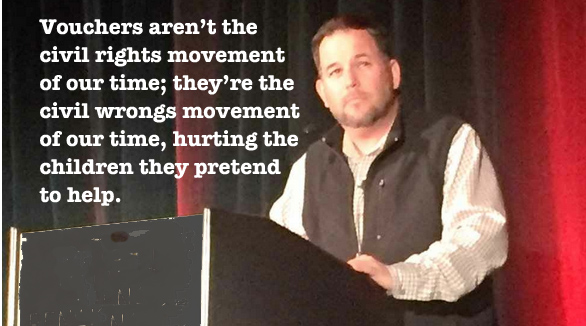Get To Know The BATS: Teachers Fighting Privatization

Above photo: New York teachers and parents took to the streets in protest of an education budget they say furthers free market education reforms. (United Federation of Teachers / Instagram)
Editor’s Note: With the appointment of billionaire school privatization advocate Betsy DeVos to US Secretary of Education, the fight for education justice has stepped into hyper speed. We have never needed solidarity like we do now. Get to know one network of teachers who are partnering with others and taking things into their own hands. - Simon Davis-Cohen
Chris Christie once told a Badass Teacher that he was “sick”of people like her. It was his response to the question posed by her sign: Schools in NJ are among the top 3 in the country. Why does Governor Christie portray our schools as failure factories?“You know what,”he said, “I’m tired of this. I’m so sick of you people. What do you want?”He pointed his finger in her face, “just go do your job.”
It was 2014, seven years into Melissa Tomlinson’s career as a public middle school special education teacher in Buena, NJ—and six months after the founding of the Badass Teachers Association (BATs) network.
Some might know BATs for their online activism and role in the campaign against Betsy DeVos. Organized horizontally through committees, we have chapters in every state, but all are autonomous to account for unique obstacles and local culture. For example, in Tennessee, BATs have to be able to work with Republican candidates while fighting against Achievement School District models, whereas California BATs focus more on Democrats in their campaigns to resist charters and privatization.
In the fight against charter schools, and cuts to public education and teacher pensions, in New Jersey, Tomlinson and other teachers are fighting for community control of education and against state takeovers of elected school districts.
We do more than tweet and post memes. After the bell rings, we can be found running for union and political office, spearheading campaigns against pro-charter school companies like Pearson and the Gates Foundation or testifying at school board meetings in cities and towns across the country.
Washington BATs have been working on a campaign to fully fund the public school system while conscientiously objecting to standardized tests. As an organization, BATs support any teacher that is willing to stand up and refuse to administer standardized tests by connecting them with others that have taken a stand and publicly praising their actions. New Jersey and New York BATs are also working on campaigns to refuse standardized testing and in Ohio there is a campaign against the state’s new graduation testing requirements.
On the national level, BATs in the National Education Association (NEA) and American Federation of Teachers (AFT) have caucused to hold the unions accountable and to push them to do better. For example, each year the NEA BATs work on business items that are debated on the NEA Convention floor and which set NEA policy for the coming year. In the past, NEA BAT caucus members pushed business items that lead to an updated climate change curriculum and which pushed forth revisions to NEA’s charter school policy. This year the NEA Convention is in Boston. The BAT Quality of Worklife Team, composed of BATs from across the country, worked with the AFT to produce a groundbreaking study on teacher stress, which resulted in an amendment (Section 2301 N of Title II) into the new ESSA federal education law that allowed Title II money to be used to study teacher workplace conditions.
The BAT network mobilized with protest, testimony and an Amicus Brief against the Supreme Court’s Friedrichs vs. California Teachers Association (2016), which could have gutted teacher and other public unions’power to collect agency fees and opened the door to national “Right to Work.” The decision ended in a 4-4 tie.
Teachers across the country are under attack. In Jersey, teachers have mandated contributions to a pension system that is not being funded by the state and NJ schools have lost billions in funding since governor Christie took office. Beyond the cuts, teachers’are Get To Know The BATS: Teachers Fighting Privatization | PopularResistance.Org:
Badass Teacher (BAT) Association




















